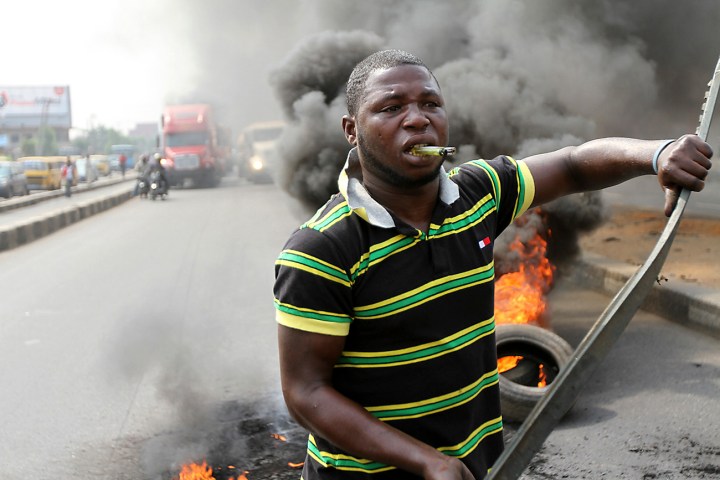Nigeria has scrapped fuel subsidies, causing petrol prices to double overnight. For many of Nigeria’s citizens, cheap petrol was the only proof that they lived in an oil-producing country and they’re not at all happy that this too has now been taken from them. By SIMON ALLISON.
The economic theory behind Nigeria’s decision to stop subsidising fuel is sound – it costs the government far too much to maintain. And that money will be better spent on health, education and infrastructure. But the nuances of economic theory were scant consolation to the millions of Nigerians who woke up on Tuesday morning – the first working day of 2012 – to discover their transport costs had doubled overnight. Petrol from the pumps went up from 65 Naira (R3.20) to 144 Naira (R7.10), with a knock-on effect on taxi and bus fares.
Not unpredictably, the public response was angry. In Lagos, protesters closed petrol stations and motorways and hijacked buses. Protests in Kano were so fierce that one man was reportedly shot dead by police, although this has not been confirmed. Protesters were worried about steep increases to their cost of living, but also questioned where the money saved by the government would go – with many convinced it would find its way into politicians’ bank accounts rather than worthy public projects. This fear is not unfounded given Nigeria’s reputation for corruption.
It’s not a good time for President Goodluck Jonathan to be dealing with this kind of internal dissent, given the daunting problems he’s already facing. The threat posed by Boko Haram, the Islamist militant group operating in the north, grows daily threatening to spill over into a civil war; the likelihood of this increases if Jonathan loses public support. However, the fact that he’s pressing ahead with the controversial fuel policy anyway is a sign that perhaps – just perhaps – Jonathan is putting Nigeria’s interests above political expediency, which would be a most unusual step for a modern Nigerian president, but one which he might not get away with in the combustible political atmosphere of Nigeria today. DM

Photo: A protester walks past burning tyres while biting a lighter during a rally against fuel subsidy removal on Ikorodu road in Nigeria’s commercial capital Lagos January 3, 2012. Hundreds of demonstrators in Nigeria’s commercial capital Lagos shut petrol stations, formed human barriers along motorways and hijacked buses on Tuesday in protest against the shock doubling of fuel prices after a government subsidy was removed. REUTERS/Akintunde Akinleye.



















 Become an Insider
Become an Insider